Before voting in the poll, please read the text below. Vote on the entry that you feel best describe your position.
This is an early look at an experiment I have been working on. It is not a remote control. It is the actual Podium application running on an iPhone/iPod Touch. Working title for the app is “Mobium” 😉 (mobile Podium). I don’t expect Apple would accept the app if it was called iPodium. Here are some screenshots scaled down from the iPhone4 960×480 display resolution:
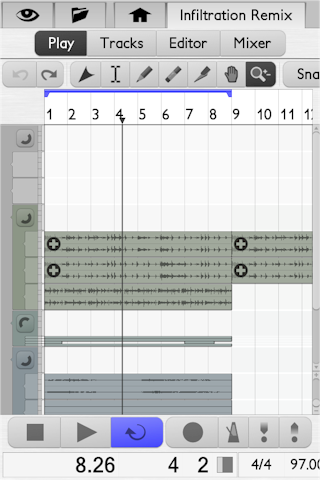
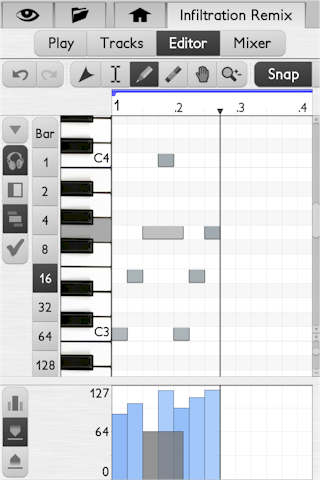
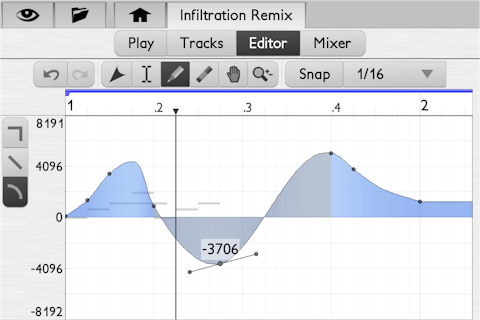
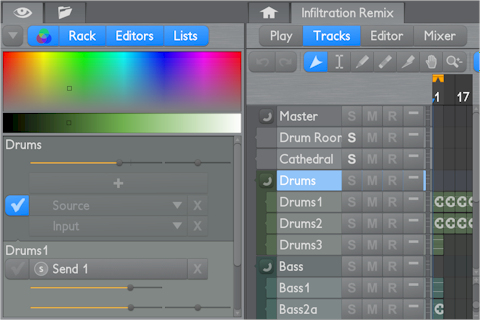
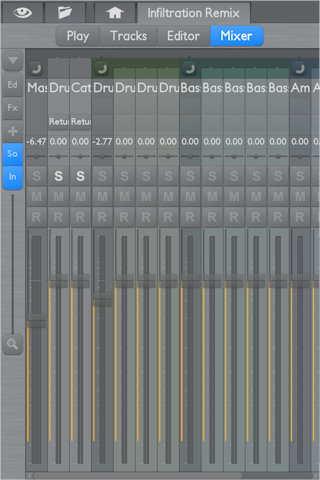
Some background info:
Let me start by apologizing to those that are patiently waiting for new Podium features. In the last couple of months I have taken some time off to experiment with new technology that I believe is going to be very important for the future success of Podium. Every once in a while I need to invest some time in keeping up to date with new trends within software development.
In previous topics on this forum, I have mentioned that I was looking forward to implementing multi-touch support in Podium. Until recently I believed that this would involve Windows 7, with its new multitouch features. Over the years I have followed the development of the various mobile platforms, mainly iOS and Android, and it has become clear to me that these platforms are taking over the market that Windows 7 tablets were supposed to inhabit. The iPad is selling like candy, and a plethora of Android tablets have been announced to launch soon. Windows 7 tablets are not happening.
If you had asked me just a few months ago, I would have said that the next platform I would port Podium to would most likely be OSX. Recently I stumbled over a development tool that allowed me, with minor changes, to use my existing Podium source code and compile it to run on iOS and Android. In the last couple of months I have been working on extending the Podium core framework, so that it can compile to run on both Windows and iOS. Mobium is compiled from the Podium source code, similar to how Podium Free is compiled. This means I can continue development on Podium, and Mobium will automatically get the new features. Another benefit of the work I have done on the core framework, is that it will be easier to port Podium to for example OSX in the future.
Six weeks ago I bought an iPod Touch, as I wanted to start out with the smallest device, and test if it was practical to use Mobium on this. It is of course larger tablets, such as the iPad, that is the ideal device for Mobium.
So far it is only the UI that I have partially working. To make playback work, I’ll have to wait for a feature update to the development tool that I’m using. Once I get playback working, it may turn out that the current generation of tablets are not powerful enough to handle a normal Podium project. However, many of the announced next generation tablets are going to have dual-core processors, so it won’t be long before tablets have enough power to handle a full Podium project.
There are of course a lot of open questions in regards to what features Mobium can support:
iOS does not support plugins, so any effects and instruments have to be embedded into the Mobium app. The Zynewave VST effect plugins can be embedded into the app. I would need to bump up the priority of making more effect plugins, a sampler and a synth. This is something that could be done with the help of third-party developers.
As long as a Podium project uses effects and instruments that are available in Mobium, you will be able to copy the Podium project from your Windows PC to your device running Mobium, go out and work on the project on the bus/train/park/beach, and then copy the project back to Podium once you get home. This can be done over Wi-Fi, or directly to the device through document sharing in iTunes.
The pixel density varies greatly between the different mobile devices. The retina display on the iPod Touch has 326 PPI (pixels per inch), while the iPad has 132 PPI. For this reason I think it is important that the user can scale the UI, in order to fit the different device sizes, but also to adjust for different usage scenarios. The scalable Podium UI is a perfect fit for mobile devices. I have implemented support in Mobium to scale the UI with three-finger gestures.
I will soon return to normal Podium development, but I will continue to occasionally experiment with Mobium in the months to come. Don’t expect to see Mobium released within the next 6 months. I plan to implement some UI features in Podium that will make it possible to compact the UI layout for smaller screens. An example of such a feature would be support for scrolling the elements in a toolbar.
Watch this topic for updates on Mobium.
Feel free to post questions and suggestions.
This looks good, I would definitely would use this on Android when I get the Archos 43.
About the Windows 7 tablets, they do indeed exist and more are coming. The difference is the popularity. The Android tablets that are available and the ones that are coming are cheaper than any win7 tablet and Apple, well Apple’s marketing department has majority of the human race brainwashed.
I’m confused why you would need multitouch in a program like this though.
Amazing stuff Frits,
I have done and will continue to use my laptop for mobile work. Not as portable but the capabilities/feature set for these Pad/touch devices just doesn’t compare.
(I have 620GB of storage on my laptop, and USB, Display Port & Firewire ports. 😛 )
I am intrigued buy the multi-touch aspect tho, and would be pretty enthusiastic about a remote-control capability for the “full-version”. Given the challenges of instruments etc, could this be a half-way step to full mobility?
I am sorry to be one on the negative side…
I see your point on marketing, but for me the developement is quite slow anyway and concentrating on other platforms even if you can use the source code will make it even slower as you pointed yourself…
Second: For me it´s even hard to work with a 23″ monitor to keep the best visibility, I could never imagine to “work” on the display of a mobile…
Third and most important: I am completely against all the stuff going up with those smart phones and pads…people loosing focus on the real world more and more and I could barf by watching newer commercials: Hey spend more time in the real world, we bring to you more modern apps, they are so easy and fast to use, you got more “precious” time left to see what´s going on in the real world…
Did you took a look at the teenagers in the last few years…they all now how to run those apps, how to type in an sms of 300 words in 0.5 seconds but if they shall do something in the real world like speaking a simple sentence in their own native language, you only get bullshit…
We are breeding a complete generation of completely idiots with a very few “normalos” if you understand what I mean…
Please stop this insanity a very clever man had come up with, only to earn billions with the stupidity of the mankind…a mobile phone is a telephone …period
Trancit
As impressive as the tech is, I’m with Trancit 😉
Shif.
Just in case for sounding perhaps to harsh, I want to state clearly here:
Fritz, in my opinion you did a fantastic job with Podium…all features you have implemented are well figured out and the GUI is one of the best one will ever see in a sequencer and I wish you the best business of all…
In the point of marketing, I personally believe, that filling out the gaps Podium still has, will bring you better business than a new “app”
I read many posts in other forums (KVR, Reaper) …people are interested in Podium but asking for basic features, like input quantisation, routing midi to other tracks, midi fx or timestretch, which I have to negate… but important is the fact: the people are interested in Podium!
Perhaps it´s the better way to concentrate on these gaps before jumping on another train, where you find a lot of competition again…
Trancit
i’m pretty much with trancit too. i follow a number of blogs ie. synthtopia, createdigitalmusic etc. and it’s dismaying to see the amount of ipad, iphone, mobile phone etc. apps filling up it’s pages. it’s all catering for what i call the short attention span/disposable culture. if a person is going to do some serious audio work they are not going to sit on a train with a pair of headphones and a device no bigger than the palm of a your hand surely?
anyway, rant over – i think, as development is already fairly slow (not a criticism) this would only serve to impede the main apps development.
in a way though i can fully understand that you may want to develop in this direction as you need to put food on the table after all. it seems like there is a lot of development and interest in this direction generally but i think once the novelty factor has worn off in a couple of years few truly useful apps/devices will remain in the marketplace.
Looks pretty awesome in my opinion, but I’d prefer just to use a full version of Podium on an iPad, I’d never use it on my phone.
I can completely understand looking at other platforms for Podium; iOS has a lot of users. I also understand that working on 1 app for a long long time can become pretty stale (I run a software dev company too), so learning new skills can be pretty cool 🙂
The thing you have to think about with iPhone / Android is how many peope are going to use Mobium; lot’s of my producer mates wouldn’t do any serious work with an phone or a tablet… and there are also heaps of really really good apps out there like Nano Studio… how would Mobium compete?
I’m about to focus on Podium as my main DAW for all of 2011; I’d love to see it further developed or alt east have some idea of what the road map is.
Don’t worry – I think it was quite obvious you were about to head in this direction, Frits. 😉
I’ve fantasized about it before, but to be honest, I always came to the conclusion that it would not be a good idea to take a “mouse and keyboard-oriented” program and try to use it with a touchscreen. There just are different conventions to it (or at least I think there should be!).
Nevertheless, I will definitely consider getting an iThingy (or whichever OS you get it working on) just for this!
(Sorry, I broke the rules. I’m only going to read the full text plus replies now!)
I also mostly agree with Trancit that “smart-“phones are a plague at this time… mostly. 😉
However, I think the point for Podium to run on this kind of device isn’t just for marketing, but that tablets (and whatever they’ll evolve into) will become much more powerful quickly and eventually swallow up the PC/laptop market. Though one or two years back I would’ve agreed it won’t happen because so many programs (and most importantly, professional users) depend on higher specs, big screens, keyboards and other things… Tablets might be a toy right now for making music, but it started the same way on computers.
I’d be very interested to hear Frits’ thoughts on the UI matter, seeing as it should be quite exciting for him. 😉
I noticed all the standard menu buttons are missing in the screenshots – those are one of the conventions I was talking about. We all know how to do it by mouse or keyboard, but how do you reach the functions on a touchscreen? What about buttons that are always visible, like tool buttons, drop-down menus and such – is it reasonable to take them along to the “new world”, or are they better off only appearing when needed (just for example, as a single tool button stuck to the right screen edge that expands into a palette when you hover over it/draw some gesture)?
To be honest, all the iApps I’ve seen so far are either very simplified programs or simply unusable, UI-wise. Even as mobile devices will get more powerful, bigger and lighter, I think you mustn’t emulate mouse-and-keyboard behavior on them. I’m curious to learn whether you’ve thought of alternatives. Better get your patents right first, though, or Apple might become a successful innovator again soon. 😆
@Lion wrote:
I’m confused why you would need multitouch in a program like this though.
The multitouch support is essential in order to recognize gestures such as pinch-to-zoom. You’ll be able to place two fingers on the timeline and drag each anchor point in order to slide and zoom in/out. Specialized support for multitouch can be useful in some areas of the UI. Such as for dragging multiple faders simultaneously, just like on a real world mixer.
@H-man wrote:
I am intrigued buy the multi-touch aspect tho, and would be pretty enthusiastic about a remote-control capability for the “full-version”. Given the challenges of instruments etc, could this be a half-way step to full mobility?
If you mean an app that can show and control the UI of Podium running on your PC, then that is an entirely different app that would require extensive coding. For that purpose I would suggest trying some of the many available remote-desktop connection apps.
I voted something else. I’ve too a third generation iPod, with some music programs. While it’s cool play with it, it isn’t serious, I miss a lot my VSTs, and I think that everyone does. Anyway I’m planning sell it and I won’t buy an iPad or an iPhone, at least in 3-4 years.
I’m not against the development, I’m developing a pluging in two formats with only one code to mantain, so I know what you’re talking about.
I’d ask you make your first priority the actual Podium, and just use a bit of time developing the common framework, because until it doesn’t support vsts it will be a ‘toy’.
@bladerunner wrote:
i’m pretty much with trancit too. i follow a number of blogs ie. synthtopia, createdigitalmusic etc. and it’s dismaying to see the amount of ipad, iphone, mobile phone etc. apps filling up it’s pages. it’s all catering for what i call the short attention span/disposable culture. if a person is going to do some serious audio work they are not going to sit on a train with a pair of headphones and a device no bigger than the palm of a your hand surely?
anyway, rant over – i think, as development is already fairly slow (not a criticism) this would only serve to impede the main apps development.
in a way though i can fully understand that you may want to develop in this direction as you need to put food on the table after all. it seems like there is a lot of development and interest in this direction generally but i think once the novelty factor has worn off in a couple of years few truly useful apps/devices will remain in the marketplace.
I also have noticed the increased exposure that mobile apps are getting on many audio sites, but I think it is more than just a novelty factor. I agree that an iPhone on a train is never going to replace professional production in a studio, but for the creative tunemakers, it is a revelation to be able to grab your mobile device and record/compose when inspiration strikes you. I think mobile music creation is going to cannibalize the traditional PC/Mac DAWS in the years to come. In 5 years time I expect more than 95% of all music-creators will be using a mobile device as their primary way to record and arrange compositions. Those that are serious about their music will then have their work finalized on a traditional DAW in a studio setting with studio monitors.
The latest 4.2 iOS update added support for external MIDI devices. It is likely that a future iOS update will add support for external USB audio interfaces as well. Compared to a PC DAW, the main limiting factor of an iPad based studio is the CPU processing power. Assuming that in a couple of years we will have quad-core tablets, this will eventually be enough to satisfy the majority of users that just need to record a few tracks of vocal and guitar, and layer some synth and drum tracks.
No matter how good I make Podium, professional studios will never dare taking the risk of using a one-man created DAW as the cornerstone software of their studio. That means my main target are the creative musicians, and they are going towards mobile as I see it. If I stay committed to writing Windows-only software, I don’t see a great future for Podium. But I am not porting Podium to mobile devices because I think I have to, in order to stay in business. I happen to be thrilled about the possibilities that the mobile devices offer.
@Zynewave wrote:
I also have noticed the increased exposure that mobile apps are getting on many audio sites, but I think it is more than just a novelty factor. I agree that an iPhone on a train is never going to replace professional production in a studio, but for the creative tunemakers, it is a revelation to be able to grab your mobile device and record/compose when inspiration strikes you. I think mobile music creation is going to cannibalize the traditional PC/Mac DAWS in the years to come. In 5 years time I expect more than 95% of all music-creators will be using a mobile device as their primary way to record and arrange compositions. Those that are serious about their music will then have their work finalized on a traditional DAW in a studio setting with studio monitors.
The latest 4.2 iOS update added support for external MIDI devices. It is likely that a future iOS update will add support for external USB audio interfaces as well. Compared to a PC DAW, the main limiting factor of an iPad based studio is the CPU processing power. Assuming that in a couple of years we will have quad-core tablets, this will eventually be enough to satisfy the majority of users that just need to record a few tracks of vocal and guitar, and layer some synth and drum tracks.
No matter how good I make Podium, professional studios will never dare taking the risk of using a one-man created DAW as the cornerstone software of their studio. That means my main target are the creative musicians, and they are going towards mobile as I see it. If I stay committed to writing Windows-only software, I don’t see a great future for Podium. But I am not porting Podium to mobile devices because I think I have to, in order to stay in business. I happen to be thrilled about the possibilities that the mobile devices offer.
I don´t know…I believe, that “serious” but as well creative producer will not use a mobile phone or pad as much as you think in the next 5-10 years…and development of cpu´s for mobile hardware will very soon reach their limit in point of cooling…remember how much cooling you need in actual PC´s for the given power, that´s impossible to realize in mobile hardware, even laptop´s are far behind “normal” PCs…
Perhaps apps like Rebirth or some instruments with a midisequencer have a chance to be niche product but not more…
Anyway, it´s you, who decides, but I´d like to know, what do you plan for the future of Podium, what are your priorities for the further development of Podium and all the existing feature requests…
It seems, you don´t like to talk about this, you mostly say, that this or this is on the to-do list, but I´d like to know, what we can expect in nearer future.
Reaper 4 prerelease circle has started and atm Podium falls more and more behind…too much finetuning, which is important as well, but regardless of all the gaps, which need to filled…
Perhaps, you can tell us a little bit more about your personal plans of this product beside this poll topic…
